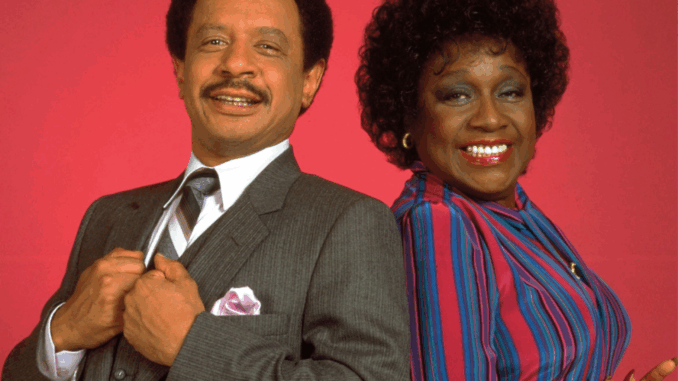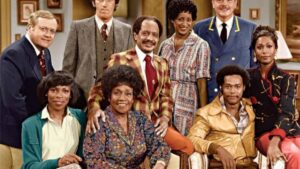
When asked how audiences reacted to controversial material on the classic CBS sitcom The Jeffersons, Berlinda Tolbert tells a story about the n-word.
Tolbert played Jenny, the biracial daughter of interracial couple Tom and Helen Willis, who were neighbors and sometimes friends of the Jeffersons. Centered on characters spun off from legendary TV producer Norman Lear‘s first sitcom hit, All in the Family, The Jeffersons featured a Black family that lived in a luxury high-rise apartment surrounded by rich white people and also the Willises.
In the first season’s 12th episode, “Like Father, Like Son,” George Jefferson (Sherman Hemsley) gives an expensive watch to his son, Lionel (Mike Evans). As Tolbert remembers it, Evans and Hemsley were rehearsing the scene in which the watch is presented. Lionel’s mother, Louise “Weezy” Jefferson (Isabel Sanford), is not pleased with the watch’s price tag.
“Mike went up to Isabel and started whispering in her ear, and Isabel started to laugh,” Tolbert remembers. “And when they went to try it again, Weezy looked at her husband, George Jefferson, and said, ‘N—–, please.'”
That phrase, sometimes used among Black folks to express exasperation, drew a huge laugh from the cast and crew, Tolbert says. So, even though Sanford was a little worried about the language, they used the ad-libbed line when taping the episode in front of a live audience.
“They said, ‘That’s one of the longest laughs we ever heard,'” Tolbert remembers producers telling Sanford. “And so, it was kept.”

That, Tolbert says, was how The Jeffersons produced classic, pioneering sitcom moments — combining the deft comic instincts of a close-knit cast with writers and producers willing to push the envelope in depictions of race and class in America.
Now 93, Marla Gibbs is the oldest living member of the core cast. She played the Jeffersons’ maid, Florence Johnston, as a recurring character in the early seasons. After table reads, the other actors would leave, but Gibbs would stick around to offer ideas, unaware that cast members were not expected to contribute.
“I wanted to know what the [producers and directors] were going to talk about; I didn’t care what the actors were going to talk about,” she says with a laugh. “I just wanted [my lines] to be real and authentic. I didn’t think like most actors, because [back then] I was not a professional actor.
“But thanks to The Jeffersons, I became a professional actor.”
As the show notches the 50th anniversary of its premiere, some of those who worked on it during its 11 seasons hail The Jeffersons as much more than a silly sitcom about a headstrong Black businessman and his family. They say The Jeffersons taught an adoring TV audience that there were Black families that didn’t live in poor neighborhoods, and that a loving romance between two people of different races was possible.
“It’s an interracial cast and interracial ensemble, and you really didn’t see that much [back then],” says Jay Moriarty, who rose through the program’s writing ranks to become an executive producer and showrunner of The Jeffersons with his partner, Mike Milligan, eventually working on the show through its seventh season.
Moriarty repeats a story Lear told in his 2014 memoir, Even This I Get to Experience. Lear says he decided to spin off a series featuring the upwardly mobile neighbors from All in the Family after members of the Black Panther party confronted him over the way Black people were depicted in another one of his classic sitcoms, Good Times (which was spun off in 1974 from Lear’s sitcom Maude).
“Good Times was garbage,” Lear wrote, quoting the Panthers, who were angry even though the show was the first U.S. network sitcom centered on a Black family with two parents. “Show’s nothing but a white man’s version of a Black family. … Every time you see a Black man on the tube, he is dirt poor.”
Lear’s solution, Moriarty notes, was to create a sitcom featuring a Black man who’d worked his way up to own a chain of dry cleaners — “movin’ on up,” as the catchy theme song says, to a luxury high-rise apartment with a maid. (That catchy, gospel-tinged theme song, by the way, was sung and cowritten by Ja’Net DuBois, who played neighbor Willona Woods on Good Times.)
Damon Evans, who would eventually replace Mike Evans as Lionel (the two actors are not related and never actually met) says that, even though he had a tough time on the show, he accepted the role because the characters were groundbreaking.
“[The Jeffersons showed] we could aspire to things and achieve them,” Damon says. “I think of kids who didn’t even know they could get past the projects until they saw The Jeffersons. So that’s the legacy.”
Moriarty adds, “When I was working for The Jeffersons, I felt like I was contributing something to society. They were showing something that hadn’t been on TV before. You couldn’t see a show like this when I was growing up in the ’60s. And it’s all because of Norman, because he wanted to do that stuff, and it worked.”
Gibbs describes the show’s continuing appeal more simply: “People are still watching it, because they connect with it. [It presented issues] they never had an opportunity to think about. But now they can not only think about it, they can laugh about it.”